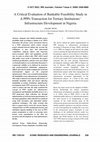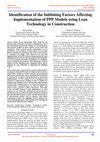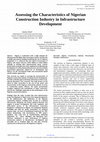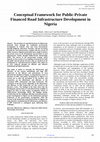Papers by QS Dr Adamu Mudi fniqs rqs mqsi (UK) fsass
International Journal of Built Environment and Earth Science, 2023

Iconic Research and Engineering Journals, 2023
Adequate and reliable bankable project feasibility study according to Adamu et al. (2015) determi... more Adequate and reliable bankable project feasibility study according to Adamu et al. (2015) determines the private sectors investment interest in a PPPs transaction which centers around project demand forecast taking into account the willingness to pay, inter and intra-model competition, ramp-up effects, and long-term macroeconomic effect and population growth rate. In order to achieve this, WEF (2013) noted that public sector needs to determine the project technical specifications, and also carry out a detail cost benefit analysis so as to determine the project's commercial viability to be followed by proactive and professionalized stakeholder engagement. Efforts must also be made to mitigate the social and environmental impact of the proposed infrastructure. This is very essential in determining the bankability of any infrastructure development. This study is aimed at assessing the effectiveness of bankable feasibility study and factors affecting bankability of tertiary institutions infrastructure development under PPP concession in Nigeria. In order to achieve this aim, the study examined the concept of PPPs models for infrastructure development and bankable feasibility process in a PPP framework. Data collection was through administration of well-structured questionnaire on the target population. Data collected were analysed using both descriptive and inferential statistic analytical techniques. The study revealed that there is urgent need to review the current Nigeria National Policy on PPP, institutional structure and individual capacity building in the area of PPPs project preparation in order to encourage more private sector participation in the drive for provision and development of road infrastructure facility.

International Journal of Engineering Research and Technology, 2019
Public Private Partnership (PPP) model has the characteristics and features that play a complemen... more Public Private Partnership (PPP) model has the characteristics and features that play a complementary role to the conventional procurement method in the provision of infrastructure facilities in many countries of the world. PPP transaction attracts private sector participation in the development and provision of infrastructure by providing finance, expertise and technology, the resources that seem to be waning in the public sector. However, the successful implementation of the PPP models is being impacted by many inhibiting factors which are left unattended to that ultimately cause loss of quality and profits in quantitative or qualitative terms to infrastructure projects. Lean Technology is hereby applied towards identifying these inhibiting factors and by adopting the same philosophy in eliminating the inhibiting factors. This research paper is based on the concept of infrastructure development through PPP models in Nigeria which involved a critical study carried out by the researchers in assessing the effectiveness and efficiency of the conceptual PPP framework in Nigeria. The research reviewed literature on the general implementation of PPP models in the development and provision of infrastructure facilities in order to identify the potential and inhibiting factors affecting the implementation of PPP models. Empirical survey was carried out through the administration of questionnaires on both the public and private sectors involved in PPP transaction. The study reveals that PPP has been widely implemented in many countries of the world for development and provision of infrastructure because PPP seeks better solution for problems like risk allocation; financial crunch; need for timely delivery of infrastructure project; lack of expertise; and quality requirements. Hence the inhibiting factors affecting the successful implementation of PPP models in the development and provision of infrastructure facilities.

Adequate and reliable bankable project feasibility study according to Adamuet al. (2015) determin... more Adequate and reliable bankable project feasibility study according to Adamuet al. (2015) determines the private sectors investment interest in a PPP transaction which centers around project demand forecast taking into account the willingness to pay, inter and intra-model competition, ramp-up effects, and long-term macroeconomic effect and population growth rate. In order to achieve this, WEF (2013) noted that public sector needs to determine the project technical specifications, and also carry out a detail cost benefit analysis so as to determine the project's commercial viability to be followed by proactive and professionalized stakeholder engagement. Efforts must also be made to mitigate the social and environmental impact of the proposed infrastructure. This is very essential in determining the bankability of any infrastructure development. This study is aimed at assessing the effectiveness of bankable feasibility study and factors affecting bankability of road infrastructure development under PPP concession. In order to achieve this aim, the study examined the concept of PPP models for infrastructure development and bankable feasibility process in a PPP framework. Data collection was through administration of well-structured questionnaire on the target population. Data collected were analysed using both descriptive and inferential statistic analytical techniques. The study revealed that there is urgent need to review the current Nigeria National Policy on PPP, institutional structure and individual capacity building in the area of PPP project preparation in order to encourage more private sector participation in the drive for provision and development of road infrastructure facility.

Management of PPP project preparation process according to WEF (2013) is quite complex because it... more Management of PPP project preparation process according to WEF (2013) is quite complex because it involves large team and multiple stakeholders such as ministries, regulatory organs and regulations, engineering firms, banks as well as multiple interfaces between different project functional feasibility studies. It is therefore very important at this stage to put together capable and experienced cross-functional project team supported by committed political and project leadership in order to achieve a sustainable PPP project preparation process. The main feature of a PPP project preparation process includes; project planning, project coordination and project monitoring. This process according to Adamuet al. (2015) can be cost intensive, therefore the public sector needs to ensure sufficient upfront funding of the entire process.This study is aimed at assessing the effectiveness of road project preparation process in the development of road infrastructure under PPP concession. In order to achieve this aim, the study examined the concept of PPP models for infrastructure development and project preparation process in a PPP framework. Data collection was through administration of well-structured questionnaire on the target population. Data collected were analysed using both descriptive and inferential statistic analytical techniques.The study revealed that there is urgent need to review the current Nigeria National Policy on PPP, institutional structure and individual capacity building in the area of PPP project preparation in order to encourage more private sector participation in the drive for provision and development of road infrastructure facility. Keyword: Public-Private Partnership, Development, Project, Preparation Process

The establishment of Infrastructure Concession Regulatory Commission (ICRC) by the Federal Govern... more The establishment of Infrastructure Concession Regulatory Commission (ICRC) by the Federal Government of Nigeria under Act 2005 and the Public Procurement Act of 2007 to drive the implementation of Public-Private Partnerships (PPPs) in infrastructure development which supposedly serve as institutional, legal and regulatory framework for attracting private sector investment in infrastructure development in Nigeria with the aim of tackling the challenges of poor infrastructure development and to improve economic growth in the implementation of PPP strategies. This is also to ensure that the transfer of responsibility to the private sector in infrastructure development follows the best international practice which is best achieved through transparency, accountability and competitiveness. This paper examined the strength and limitations of the Nigerian PPP Institutional and Legal Regulatory framework for infrastructure development. The review of literature started with the assessment of the Nigerian National Policy on PPPs followed by the in-depth assessment of the Nigerian Government legal mechanisms in the implementation of PPPs such as the adoption of ICRC Act of 2005; the creation of ICRC office; and the Public Procurement Act of 2007. A critical evaluation of Nigerian PPP Institutional and Legal Regulatory Framework was also carried out. The study revealed that lot of challenges are impacting on the effectiveness of PPP framework in road infrastructure development in Nigeria the challenges were hereby attributed to poor Nigerian National PPP Policy thereby resulting to weak and inadequate institutional, legal and regulatory structure. The study therefore concluded that the current PPP policy in Nigeria must be reviewed so as to enhance the effectiveness of the institutional and legal regulatory structure.

Public-Private Partnerships (PPPs) are strategies employed in the provision and development of bo... more Public-Private Partnerships (PPPs) are strategies employed in the provision and development of both social and economic infrastructure facilities in many countries of the word. It is a contractual arrangement between the public and private sector through which the expertise, skills, assets and financial resources of both the public and private sectors are allocated in such a manner that provides optimal service delivery and good value to the public. The major feature in the implementation and operation of PPPs in the development and provision of infrastructure facilities is the systematic evaluation and selection of development proposals that delivers value from the money invested in the transaction. Unlike the conventional procurement system, which is predominantly based on lowest cost to the public sector, hence value for money (VfM) is a measure that takes into account both the quantitative and qualitative outcomes in project development life-cycle and operational life under PPPs. This paper is based on the concept of road infrastructure development and provision through PPPs in Nigeria which involved a critical study carried out by the researcher in the course of assessing the effectiveness and efficiency of the conceptual PPP framework in Nigeria. The study reviewed literature on the global classification of PPP infrastructure facilities, PPP models for infrastructure development, and value for money evaluations in PPP implementation for infrastructure development. The study reveals that PPP has been widely implemented in many countries of the world for development and provision of infrastructure because PPP seeks better solution for problems like risk allocation; financial crunch; need for timely delivery of infrastructure project; lack of expertise; and quality requirements. Hence the value for money invested in the infrastructure development and provision.

Nigeria is confronted with a high demand for
infrastructural facilities that is growing at a fast... more Nigeria is confronted with a high demand for
infrastructural facilities that is growing at a faster rate than the
available government funding considering the size of Nigerian
population. It is evidenced that the Federal Government of
Nigeria will require between US$13 billion to US$15 billion
annually in meeting these infrastructural needs. Various
procurement strategies have been employed in facilitating the
development of various kind of infrastructure, the most notable
procurement approaches utilized for its development and
delivery are the conventional model, non-conventional model
and the modern approaches.
This research was aimed at assessing the characteristics of
Nigerian construction industry in infrastructure development.
In order to identify gaps in the body of literature in these areas,
relevant literatures were reviewed. The study focuses on the
efforts of other researchers in the area of the nature and
characteristics of the Nigerian construction industry in terms
of construction project delivery, the major procurement
strategies employed and contributions of major contractors
and the key challenges impacting on the performance of the
Nigerian construction industry.
Findings from the study revealed that most infrastructure
project development in Nigeria have been impacted negatively
by the ineffectiveness and inefficiency of the Nigerian
construction industry resulting from: (i) lack of a national
infrastructure blueprint; (ii) unclear political direction and
support in project development; (iii) weak regulatory and
enforcement powers of the Infrastructure Concession
Regulatory Commission in Nigeria; (iv) inadequate financial
modelling and value for money assessments; (v) technical
capacity gaps; (vi) lack of institutional framework for PPP
project preparation; (vii) inconsistency in PPP project
pipelines; and, (viii) lack of standardisation, hindering
replication; etc. These challenges and limitations have
therefore culminated to poor performance of Nigerian
construction industry in infrastructure development and
invariably led to resultant high cost and time overruns
experienced on infrastructure development in Nigeria.

The development and provision of road infrastructure in Nigeria has primarily been through the tr... more The development and provision of road infrastructure in Nigeria has primarily been through the traditional forms
of procurement strategies by the federal, state and local governments through budgetary allocations and
door-financed loans and grants this thereby leaves the Nigerian road sector in a precarious situation. In recent
time, with the demand for more road infrastructure arising from the population explosion and urban-rural
migration coupled with the financial crisis experienced by the Federal Government resulting from global
economic and financial crisis the Federal Government of Nigeria therefore sought to involve the private sectors
in the development of road infrastructure facilities via Public-Private Partnerships (PPPs) like the developed
countries so as to meet their economic growth.
This paper examined the state of road infrastructure development through Public-Private Partnerships in
North-Central Region of Nigeria with emphasis on the strengths and limitation of PPPs. The chapter begins with
a review of literature on the concept of PPP road infrastructure development in North-Central Region of Nigeria.
Academic literatures were also reviewed on PPP objectives, operational and financial characteristics in road
infrastructure development in North-Central Region of Nigeria this was followed with the assessment of the PPP
road infrastructure development life-cycle process and its challenges

The development and provision of road infrastructure in Nigeria has primarily been through the tr... more The development and provision of road infrastructure in Nigeria has primarily been through the traditional procurement arrangement by Federal, State and Local Governments through budgetary allocations. Recently, with the increasing demand for road infrastructure coupled with the scarcity of public resources, apolitical trend toward the deregulation of infrastructure and expansion towards global markets. The Nigerian government have sought to involve the private sector in the development and provision of road infrastructure through Public-Private Partnership (PPP). The success of this strategy lies with the creation of an enabling environment for both the public and the private sectors that will be involved in the development of the road infrastructure projects. Thiswhich can be best achieved through an efficient and effective framework.
This paper is aimed at assessing the efficiency and effectiveness of the existing framework for the delivery and performance of PPP road infrastructure projects in the Ministries, Departments and Agencies (MDAs) at Federal and State levels in Nigeria. A qualitative interview was conducted to elicit the perception of the stakeholders on the efficiency and effectiveness of the existing PPPs framework for road infrastructure projects in Nigeria using an interview guide. A comprehensive literature review was also carried out on PPP road projects in Nigeria. The respondents were basically the stakeholders who were directly involved in the development and implementation of PPP road infrastructure projects and the existing PPP framework for road infrastructure projects in Nigeria so as to assess the key challenges impacting on the efficiency and effectiveness of the existing framework. The selection of the respondents was based on job designation, scope of their professional practice and years of working experience in the construction industry. The findings of the study shows that the development and provision of road infrastructure in Nigeria has been on joint venture arrangement between the Nigerian government and the private sector inform of Public-Private Partnership (PPP). The key challenges affecting the efficiency and effectiveness of PPPs in road infrastructure projects are the legal and institutional framework for the implementation of the procurement arrangement. With the increase in the demand for road infrastructure in Nigeria, it is observed that the efficiency and effectiveness of PPPs in road development and provision is contingents upon addressing these challenges.

The development and provision of infrastructure facilities in some developing and developed count... more The development and provision of infrastructure facilities in some developing and developed countries in the world has primarily been through the traditional forms of procurement strategies by the public sector through budgetary allocations. Recently, with the demand for more infrastructure arising from the population explosion coupled with the financial constraint experienced by the government, the public sector have sought to involve the private sectors in the development of infrastructure facilities through joint ventures inform of Public-Private Partnership (PPP). However, the success of the infrastructure project delivery and performance lies in an enabling environment for both the public and the private sectors which are involved in the development and provision of the infrastructure facilities.
This paper examined the concept of project finance in road infrastructure development and delivery via Public-Private Partnership (PPP) strategies in Nigeria. An in-depth literature review was conducted on the concept of private project finance initiative for road infrastructure projects in Nigeria in order to assess the key challenges impacting on the effectiveness and efficiency of the conceptual project finance framework in Nigeria. The findings of the study shows that the development and provision of road infrastructure facility has been on joint venture arrangement between the public and the private sectors inform of Public-Private Partnerships, the findings further revealed that the key challenges affecting the effectiveness and efficiency of the conceptual private finance initiative framework in road infrastructure project development and delivery in Nigeria are the legal and institutional framework in the implementation of the procurement strategy. The study therefore concluded that the effectiveness and efficiency of the procurement strategy is contingent upon addressing these challenges as soon as possible in order to meet the demand for road infrastructure facility in Nigeria.










Uploads
Papers by QS Dr Adamu Mudi fniqs rqs mqsi (UK) fsass
infrastructural facilities that is growing at a faster rate than the
available government funding considering the size of Nigerian
population. It is evidenced that the Federal Government of
Nigeria will require between US$13 billion to US$15 billion
annually in meeting these infrastructural needs. Various
procurement strategies have been employed in facilitating the
development of various kind of infrastructure, the most notable
procurement approaches utilized for its development and
delivery are the conventional model, non-conventional model
and the modern approaches.
This research was aimed at assessing the characteristics of
Nigerian construction industry in infrastructure development.
In order to identify gaps in the body of literature in these areas,
relevant literatures were reviewed. The study focuses on the
efforts of other researchers in the area of the nature and
characteristics of the Nigerian construction industry in terms
of construction project delivery, the major procurement
strategies employed and contributions of major contractors
and the key challenges impacting on the performance of the
Nigerian construction industry.
Findings from the study revealed that most infrastructure
project development in Nigeria have been impacted negatively
by the ineffectiveness and inefficiency of the Nigerian
construction industry resulting from: (i) lack of a national
infrastructure blueprint; (ii) unclear political direction and
support in project development; (iii) weak regulatory and
enforcement powers of the Infrastructure Concession
Regulatory Commission in Nigeria; (iv) inadequate financial
modelling and value for money assessments; (v) technical
capacity gaps; (vi) lack of institutional framework for PPP
project preparation; (vii) inconsistency in PPP project
pipelines; and, (viii) lack of standardisation, hindering
replication; etc. These challenges and limitations have
therefore culminated to poor performance of Nigerian
construction industry in infrastructure development and
invariably led to resultant high cost and time overruns
experienced on infrastructure development in Nigeria.
of procurement strategies by the federal, state and local governments through budgetary allocations and
door-financed loans and grants this thereby leaves the Nigerian road sector in a precarious situation. In recent
time, with the demand for more road infrastructure arising from the population explosion and urban-rural
migration coupled with the financial crisis experienced by the Federal Government resulting from global
economic and financial crisis the Federal Government of Nigeria therefore sought to involve the private sectors
in the development of road infrastructure facilities via Public-Private Partnerships (PPPs) like the developed
countries so as to meet their economic growth.
This paper examined the state of road infrastructure development through Public-Private Partnerships in
North-Central Region of Nigeria with emphasis on the strengths and limitation of PPPs. The chapter begins with
a review of literature on the concept of PPP road infrastructure development in North-Central Region of Nigeria.
Academic literatures were also reviewed on PPP objectives, operational and financial characteristics in road
infrastructure development in North-Central Region of Nigeria this was followed with the assessment of the PPP
road infrastructure development life-cycle process and its challenges
This paper is aimed at assessing the efficiency and effectiveness of the existing framework for the delivery and performance of PPP road infrastructure projects in the Ministries, Departments and Agencies (MDAs) at Federal and State levels in Nigeria. A qualitative interview was conducted to elicit the perception of the stakeholders on the efficiency and effectiveness of the existing PPPs framework for road infrastructure projects in Nigeria using an interview guide. A comprehensive literature review was also carried out on PPP road projects in Nigeria. The respondents were basically the stakeholders who were directly involved in the development and implementation of PPP road infrastructure projects and the existing PPP framework for road infrastructure projects in Nigeria so as to assess the key challenges impacting on the efficiency and effectiveness of the existing framework. The selection of the respondents was based on job designation, scope of their professional practice and years of working experience in the construction industry. The findings of the study shows that the development and provision of road infrastructure in Nigeria has been on joint venture arrangement between the Nigerian government and the private sector inform of Public-Private Partnership (PPP). The key challenges affecting the efficiency and effectiveness of PPPs in road infrastructure projects are the legal and institutional framework for the implementation of the procurement arrangement. With the increase in the demand for road infrastructure in Nigeria, it is observed that the efficiency and effectiveness of PPPs in road development and provision is contingents upon addressing these challenges.
This paper examined the concept of project finance in road infrastructure development and delivery via Public-Private Partnership (PPP) strategies in Nigeria. An in-depth literature review was conducted on the concept of private project finance initiative for road infrastructure projects in Nigeria in order to assess the key challenges impacting on the effectiveness and efficiency of the conceptual project finance framework in Nigeria. The findings of the study shows that the development and provision of road infrastructure facility has been on joint venture arrangement between the public and the private sectors inform of Public-Private Partnerships, the findings further revealed that the key challenges affecting the effectiveness and efficiency of the conceptual private finance initiative framework in road infrastructure project development and delivery in Nigeria are the legal and institutional framework in the implementation of the procurement strategy. The study therefore concluded that the effectiveness and efficiency of the procurement strategy is contingent upon addressing these challenges as soon as possible in order to meet the demand for road infrastructure facility in Nigeria.
infrastructural facilities that is growing at a faster rate than the
available government funding considering the size of Nigerian
population. It is evidenced that the Federal Government of
Nigeria will require between US$13 billion to US$15 billion
annually in meeting these infrastructural needs. Various
procurement strategies have been employed in facilitating the
development of various kind of infrastructure, the most notable
procurement approaches utilized for its development and
delivery are the conventional model, non-conventional model
and the modern approaches.
This research was aimed at assessing the characteristics of
Nigerian construction industry in infrastructure development.
In order to identify gaps in the body of literature in these areas,
relevant literatures were reviewed. The study focuses on the
efforts of other researchers in the area of the nature and
characteristics of the Nigerian construction industry in terms
of construction project delivery, the major procurement
strategies employed and contributions of major contractors
and the key challenges impacting on the performance of the
Nigerian construction industry.
Findings from the study revealed that most infrastructure
project development in Nigeria have been impacted negatively
by the ineffectiveness and inefficiency of the Nigerian
construction industry resulting from: (i) lack of a national
infrastructure blueprint; (ii) unclear political direction and
support in project development; (iii) weak regulatory and
enforcement powers of the Infrastructure Concession
Regulatory Commission in Nigeria; (iv) inadequate financial
modelling and value for money assessments; (v) technical
capacity gaps; (vi) lack of institutional framework for PPP
project preparation; (vii) inconsistency in PPP project
pipelines; and, (viii) lack of standardisation, hindering
replication; etc. These challenges and limitations have
therefore culminated to poor performance of Nigerian
construction industry in infrastructure development and
invariably led to resultant high cost and time overruns
experienced on infrastructure development in Nigeria.
of procurement strategies by the federal, state and local governments through budgetary allocations and
door-financed loans and grants this thereby leaves the Nigerian road sector in a precarious situation. In recent
time, with the demand for more road infrastructure arising from the population explosion and urban-rural
migration coupled with the financial crisis experienced by the Federal Government resulting from global
economic and financial crisis the Federal Government of Nigeria therefore sought to involve the private sectors
in the development of road infrastructure facilities via Public-Private Partnerships (PPPs) like the developed
countries so as to meet their economic growth.
This paper examined the state of road infrastructure development through Public-Private Partnerships in
North-Central Region of Nigeria with emphasis on the strengths and limitation of PPPs. The chapter begins with
a review of literature on the concept of PPP road infrastructure development in North-Central Region of Nigeria.
Academic literatures were also reviewed on PPP objectives, operational and financial characteristics in road
infrastructure development in North-Central Region of Nigeria this was followed with the assessment of the PPP
road infrastructure development life-cycle process and its challenges
This paper is aimed at assessing the efficiency and effectiveness of the existing framework for the delivery and performance of PPP road infrastructure projects in the Ministries, Departments and Agencies (MDAs) at Federal and State levels in Nigeria. A qualitative interview was conducted to elicit the perception of the stakeholders on the efficiency and effectiveness of the existing PPPs framework for road infrastructure projects in Nigeria using an interview guide. A comprehensive literature review was also carried out on PPP road projects in Nigeria. The respondents were basically the stakeholders who were directly involved in the development and implementation of PPP road infrastructure projects and the existing PPP framework for road infrastructure projects in Nigeria so as to assess the key challenges impacting on the efficiency and effectiveness of the existing framework. The selection of the respondents was based on job designation, scope of their professional practice and years of working experience in the construction industry. The findings of the study shows that the development and provision of road infrastructure in Nigeria has been on joint venture arrangement between the Nigerian government and the private sector inform of Public-Private Partnership (PPP). The key challenges affecting the efficiency and effectiveness of PPPs in road infrastructure projects are the legal and institutional framework for the implementation of the procurement arrangement. With the increase in the demand for road infrastructure in Nigeria, it is observed that the efficiency and effectiveness of PPPs in road development and provision is contingents upon addressing these challenges.
This paper examined the concept of project finance in road infrastructure development and delivery via Public-Private Partnership (PPP) strategies in Nigeria. An in-depth literature review was conducted on the concept of private project finance initiative for road infrastructure projects in Nigeria in order to assess the key challenges impacting on the effectiveness and efficiency of the conceptual project finance framework in Nigeria. The findings of the study shows that the development and provision of road infrastructure facility has been on joint venture arrangement between the public and the private sectors inform of Public-Private Partnerships, the findings further revealed that the key challenges affecting the effectiveness and efficiency of the conceptual private finance initiative framework in road infrastructure project development and delivery in Nigeria are the legal and institutional framework in the implementation of the procurement strategy. The study therefore concluded that the effectiveness and efficiency of the procurement strategy is contingent upon addressing these challenges as soon as possible in order to meet the demand for road infrastructure facility in Nigeria.